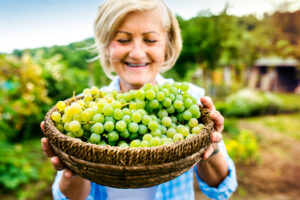Fruits, Vegetables Are Essential for Eye Health

You may want to consider a fruit salad for dessert instead of pecan pie this Yuletide season. According to a recent study in Food & Function, eating grapes may improve eye health in older adults and reduce the risk of vision problems.
What Contributes to Eye Disease?
The eye is a specialized organ that is especially susceptible to damage. The retina is an environment with high levels of oxidative stress, meaning free radicals can damage proteins and DNA. Free radical damage increases as we age, which is why older age is a risk factor for most eye diseases. Another factor contributing to eye disease is elevated levels of ocular advanced glycation end products (AGEs). These substances can damage the retina and impair cell function.
Antioxidants in Grapes
Eating foods high in antioxidants can prevent AGEs from forming and decrease oxidative stress. Antioxidants remove potentially damaging oxidizing agents and protect cells from premature aging. Grapes have high levels of antioxidants and polyphenols, which can improve macular pigment optical density (MPOD).
A new study analyzed 34 people who ate either 1.5 cups of grapes per day or a placebo for 16 weeks. The subjects who ate grapes showed higher levels of MPOD, polyphenols and plasma antioxidant capacity. Participants who did not eat grapes had higher levels of harmful AGEs.
“Our study is the first to show that grape consumption beneficially impacts eye health in humans, which is very exciting, especially with a growing aging population,” said Jung Eun Kim, PhD. “Grapes are an easy, accessible fruit that studies have shown can have a beneficial impact in normal amounts of just 1 ½ cups per day.” (News Medical)
Kim is an assistant professor in the Department of Food Science & Technology, National University of Singapore.
Eat a Diet High in Antioxidants This Holiday Season
Antioxidants and polyphenols do not just preserve your vision. They protect the body against oxidative stress and associated health problems like cancers, heart disease and inflammation. This holiday season, be mindful of what you are putting in your body. You can prepare a savory, healthy meal and toothsome sweet treats with research and careful planning.
Enhance your traditional holiday meal’s flavor and nutritional profile by making minor substitutions. Instead of using butter, sour cream and cream cheese in your vegetable dishes, try a high-quality extra virgin olive oil and herbs. A fresh fruit salad can be just as sweet as a cake or pie without the sugar crash.
Increase Your Consumption of Eye-Healthy Nutrients
Make it a goal to eat healthy all year long. A diet high in fruits, vegetables, whole grains and lean meats can help keep your vision clear and prevent eye diseases like cataracts, macular degeneration and glaucoma.
Researchers agree getting essential vitamins and nutrients from food is best. Here are important antioxidants and vitamins, along with foods that contain high amounts (Harvard Health):
- Lutein, zeaxanthin — Broccoli, Brussels sprouts, collard greens, corn, eggs, kale, nectarines, oranges, papayas, romaine lettuce, spinach, squash
- Omega-3 fatty acids — Flaxseed, flaxseed oil, halibut, salmon, sardines, tuna, walnuts
- Vitamin A — Apricots, cantaloupe, (raw) carrots, mangos, red peppers (raw), ricotta cheese (part-skim), spinach, sweet potatoes
- Vitamin C — Broccoli, Brussels sprouts, grapefruit, kiwi, oranges, red peppers (raw), strawberries
- Vitamin E — Almonds, broccoli, peanut butter, spinach, sunflower seeds, wheat germ
- Zinc — Chickpeas, oysters, pork chops, red meat, yogurt
When was the last time you scheduled a comprehensive eye exam? A complete eye exam with dilation takes only an hour but provides a year of benefits. Call today for an appointment.
